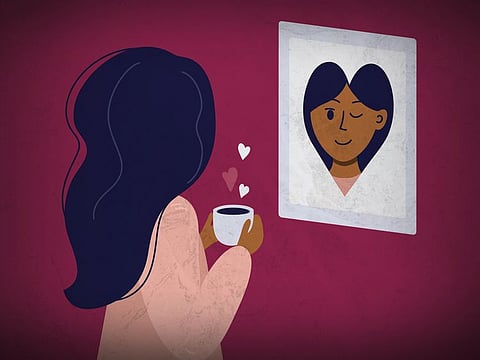In search of a world beyond inch-tapes and vanity
You define beauty yourself. Society doesn’t define your beauty

The image in the mirror petrifies her, so much so that my niece has stopped using that full-size mirror in her room. The “ugliness” that looks back at her seems to make her squirm. To me, Maya is a beautiful girl. However, the world of social media-the beautiful profiles that generate “likes”, the popular definitions of “beauty”, have left scars in many minds. Worst is her phobia of the trial rooms.
She complains, “The lights in there can be cruel and the mirrors seem to magnify my fatness phenomenally. I feel that I am on trial, with the looking glass judging me. And it’s not like Snow White’s stepmother’s mirror, which soothes your self-esteem!” Hence, she just buys clothes a size bigger so that it would fit her for sure without any trial at the trial room. I try and explain to her that all those “perfect” bodies that she wants to emulate are airbrushed and “magic-wanded”!
As a child, I was fat. My school mates named me “fatso”, “Appu”, “SLP”-shapeless lump of protoplasm” and the list is a long one. According to people around me, ‘fat’ was synonymous with ‘obnoxious’. The years of adolescence made me feel worse, especially when I wore the P.E. uniform. “Elephant legs” and “stumps” were what my legs would be described as and the mocking laughter had a vitriolic effect on my psyche.
Food had become an anathema to my being, I starved myself to ‘lose weight’ and in order to wash away all the hurt I channelised my energy into excelling academically. Fortunately, as the years passed by my body issues dissolved, thanks to the support from one of my teachers, who’d always tell me, “There’s nobody more beautiful than the person who is comfortable in her own skin. Work towards getting fitter not ‘thinner’.”
Virtual filters
The pandemic has brought to the fore an uglier situation in this regard. With video calls and virtual meetings that were on the rise, people had become conscious about the way they needed to look on screen. Virtual filters had done the job for my friend, Seema, a PR executive. She has piled on “lots of weight” since her gym was closed and her husband who was known for his perfect body is on the edge, absolutely traumatised.
Now, they have to go back to office, hence, he plans to take resort to something called ab-sculpting and abdominal etching, a technique that can help you achieve the perfect six-pack abs. As for Seema, she’s going in for a facial rejuvenation and has asked her surgeon to chisel her face, make it look just as perfect as her filtered selfies on social media. The pressure to acquire such cosmetic goals mounts each passing day. Thus, there’s a profusion of cosmetic clinics around where I live.
We are getting sucked into a rabbit hole, the destination is an unreasonable image created by media and brand advertisements. The truth that bodies come in all shapes and sizes is ignored, conveniently; fogging countless minds, giving rise to an involuntary spree of self-shaming.
Body positivity
I use the term ‘body positivity’ frequently these days. It is a movement that represents “appreciation, respect and acceptance for bodies as they are, and for the functions and activities they do”. Body positivity dates back as far as 1850, where women protested that they should not be required to use corsets to change their body shape.
The movement encourages a rejection of ideas that bodies must fit a certain mould. I’m trying to propagate this belief around me, the belief that body shape, size, colour don’t really matter, let’s work towards nurturing a heart that’s healthy and happy.
As I grow older, I conclude that ‘ugliness’ isn’t the absence of beauty, it’s just the presence of unreasonably crafted standards of idealness, so mirage-like that it creates a horrendous version of the self.
These words spoken by Lady Gaga will be etched in my heart forever- “You define beauty yourself. Society doesn’t define your beauty.”
Navanita Varadpande is a writer based in Gurgaon, India. Twitter: @VpNavanita
Sign up for the Daily Briefing
Get the latest news and updates straight to your inbox



